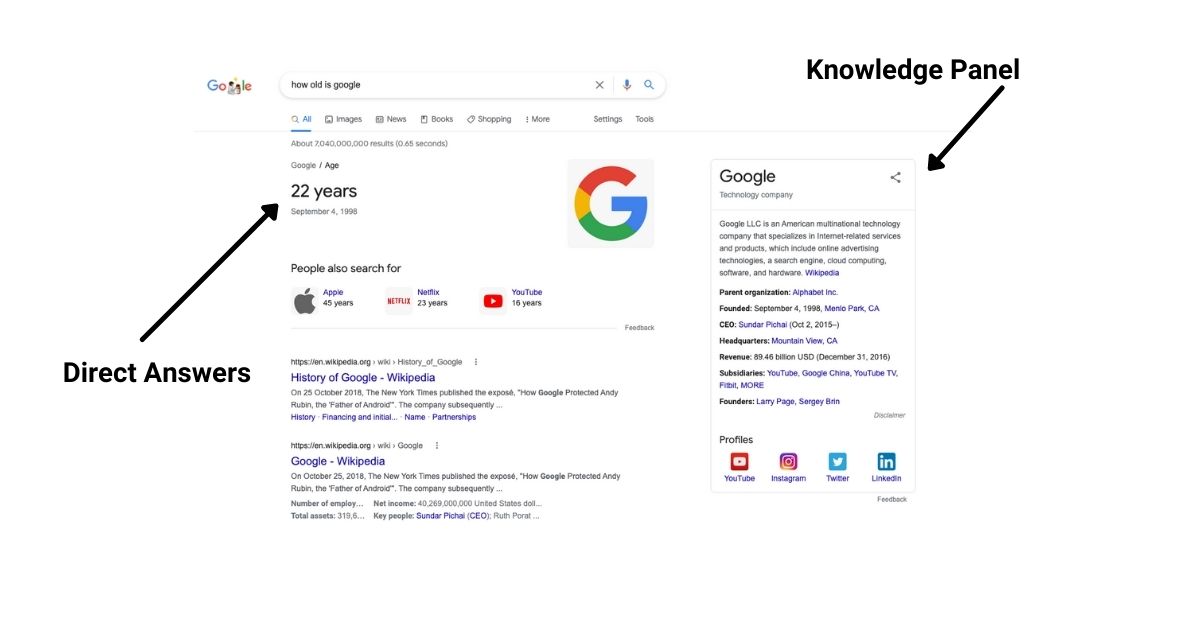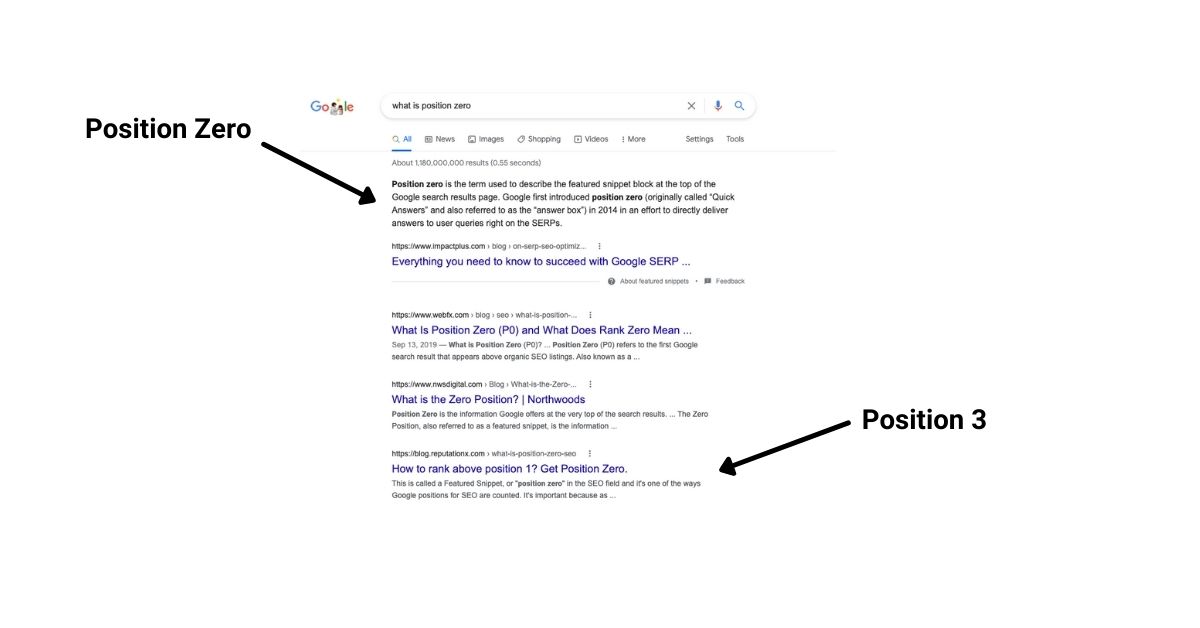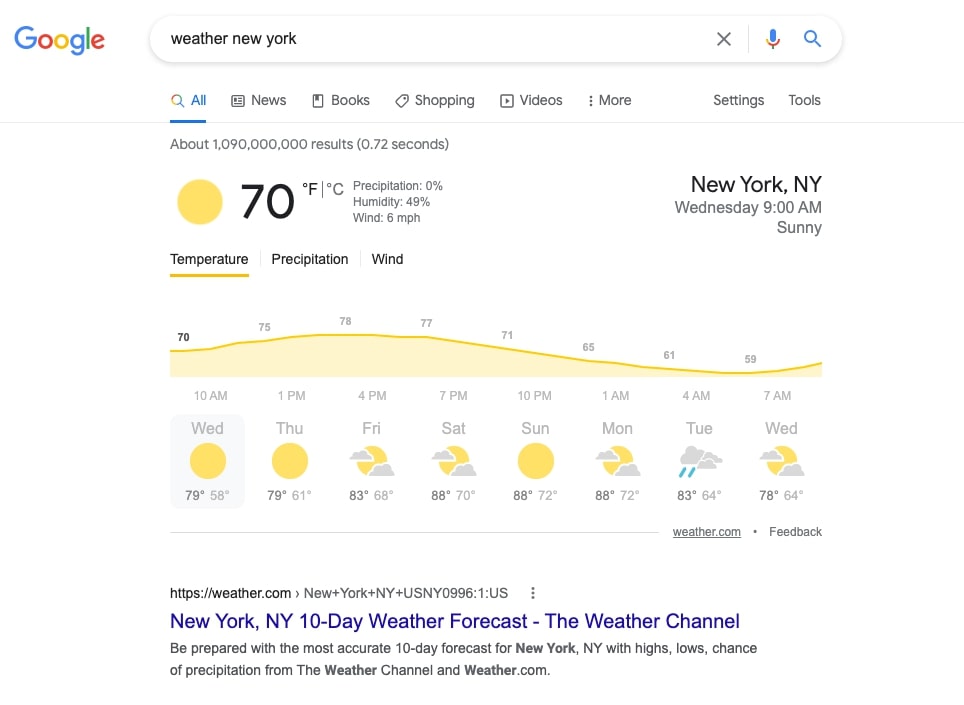Zero-click, no-click, low-click — what does it matter for your site, organic search, and marketing strategy today? It’s easy to get stuck in the weeds of every new update as the modern search journey shifts. But a dynamic strategy that keeps your business prepared for your optimal search position helps your brand stay ahead of the latest changes — and your competition.
Researchers and search marketers don’t agree on the exact percentage of growth that zero-click searches have seen in the last year — but everyone can agree that it’s growing fast.
Before diving into developing a healthy SEO strategy with the changing search landscape, let’s define some common terminology.
Search Definitions + Terms
Most marketers don’t deal with the nitty-gritty of organic search and SEO every day, below are high-level definitions of commonly used search terms throughout this article.
Search Query: The string of text that a user types into a search engine (Google, Bing, Yahoo!, etc.) to receive a list of results (SERP) with information that answers their query.
Search Engine Results Page (SERP): The page a search engine shows the user based on the submitted search query. The SERP can show organic search results from third-party websites, paid search results, pay-per-click ads, widgets, featured snippets, and more.
Zero-Click Search: Zero-click search queries are when search engines do not send the user to a third-party website from an organic search result. Instead, the search engine itself provides the answer via features such as Google’s Direct Answers or Knowledge Panel. While you might not know the exact names for these features, you’ve likely seen and used them, especially on mobile.

Zero-click search includes no-click search and low-click search. Low-click search refers to in-platform actions. For example, Google offers Maps, Shopping, Bookings, and more so users don’t have to leave Google and go to a third-party website to complete their desired digital action. This is most common with short, broad search queries, including:
- “weather new york”
- “cubs game tonight”
- “coffee near me”
These queries are answered by the search engine through various widgets and features. Users don’t need to click at all (or maybe only once or twice within the search engine) to find the answers they’re looking for. As Google continues to expand its features to include widgets that help users find a location, check the weather, calculate a tip, and more, how will this affect your Search Engine Results Page (SERP) ranking? And what can you do about it?
Short answer — it depends. Your site’s verticals and offerings will dictate how your SERP ranking will continue to be affected as zero-click search queries increase. So, the best way to prepare is to know exactly what your opportunities are — and how to make the most of them.
Search Opportunities for Brands + Sites
There isn’t a one-size-fits-all solution to organic search success. Understanding exactly what the rise of zero-click queries means for your organic search strategy can help your business stay ahead of what’s next in the digital landscape.
Know your customer journeys.
Finding the right opportunity for your site is rooted in a deep understanding of your customers and their search journey. Understanding how customers naturally engage across their entire digital ecosystems solidifies an effective search strategy. And you may find that fighting to be in Position Zero (or P0) may not serve your holistic search strategy. If instead, your site is at the top of the first results page in Position 2 or 3, your site could see higher click-through rates depending on the search query.

For example, if your site can provide users with a well-developed answer to their search query, they are more likely to click on your site to learn more than to just have a short answer provided to them.
Focus on best practices and your business’s bottom line.
Strategic organic search understands how the latest updates and changes to the search landscape will directly affect your KPIs and business goals — and will focus on what’s best for your bottom line.
Thus, your brand’s “zero-click search” strategy shouldn’t stand alone or be a duplicate effort. Instead, a successful, comprehensive organic search strategy includes the newest changes to the search landscape as zero-click queries, and mobile usage continue to grow. If your search strategy already includes developing good on-page optimization, schema mark ups, and web and page speed performance, your site is well-positioned to continue adapting for the rise of zero-click. If your search strategy priorities best practices, compliance, and performance, then your strategy might only need to shift to accommodate the latest updates. However, a full audit is recommended to map opportunities that are unique to your business.
Sites Most Affected by Zero-Click Queries
While every site needs to adjust, some are impacted more than others. Ecommerce sites and sites that help with simple tasks (calculators, weather information, etc.) are currently the most affected by the rise of zero-click queries, in terms of organic traffic.
Third-Party Ecommerce
Google Shopping and its one-click payment has radically changed ecommerce by allowing consumers to buy in-platform. This growing change overhauls third-party ecommerce search — and businesses will need to pivot to find a new way to compete. For products with a shopping cart icon, customers can check out using their Google Account information and don’t need to click to another site. What does this mean for third-party ecommerce sites that have worked to achieve organic ranking? While convenient for users, the expansion of Google Shopping is a major change to any third-party ecommerce company.
Widget-Like Sites
As Google offers a zero-click solution to calculate your mortgage, check the weather, or find directions, what should sites with similar offerings do? Ecommerce businesses must optimize to integrate these additional interphases or pivot for better results elsewhere.
Long past the days of ten blue links, Google OneBox offers a separate display box within the SERPs that shows results from Google’s universal search. OneBox integrates the results from Google’s vertical search engines in the organic SERPs.

Successful Search Tactics
The cost-benefit analysis of climbing to Position Zero is different for every business. Identify what it means to yours. It can be good (or even bad) depending on other factors. Your business and marketing strategy informs the ranking you’re going after. And your actual needs might surprise you.
Understand your best rank in universal search.
To position your business within Google’s universal search, you’ll need to identify if ranking first makes sense for the effort required, especially on mobile. What is universal search again?
“Universal search is the ability to search all content across multiple databases through a single search box. Although content sources might reside in different locations, such as a different index for specific types or formats of content, they appear in a single, integrated set of search results.”
– Dave Davies Search Engine Journal 5.27.2020
As this trend grows, principally in ecommerce, you need to know exactly which search queries are available to go after — and which ones make sense for your business.
By acknowledging nuance and aligning with company goals, your team can harness zero-click search to find the right opportunities for your business. While the long-term goal is conversion and revenue, effective search strategy at every stage of the customer journey is individual to the business and user. When users are in research mode, they naturally click more often, and your content marketing is less likely to be impacted.
Make the most of mobile search.
Fully understand how zero-click search is affecting your mobile search visibility for your customers. The biggest changes could be for your mobile strategy as zero-click has dramatically impacted this landscape and your current plan will likely need to be updated.
Test for your ideal ranking.
If your site is ranking Position 2 or Position 3 in the SERPs, it might receive more traffic than if your site was a featured snippet. Maximizing your clicks and achieving a truncated answers can be great (or not so great) for your customers — always be where it’s best for them. Is more awareness better for your business goals? Should you reallocate resources? Test to identify strategic next steps so your customers can find your brand in just the right moment — every time.
Diversify with additional traffic sources.
Additional organic content sources can grow brand awareness outside of competing for the featured snippet. Three increasingly important features are Google News, Top Stories, and Google Discover.
Google News: Available on your browser and a mobile app, Google News is a growing news aggregator. Successful content is differentiated by providing original reporting or offering a unique angle not found on other sites. And timeliness is everything — especially if it’s breaking news that’s happening in the moment.
Top Stories: Google’s Top Stories is a goldmine of organic traffic for news publishers. The article’s headline is crucial to gaining a spot in the carousel as its considered the primary title of the page. Optimizing site content can efficiently grow brand awareness and traffic for news sites.
Google Discover: Launched in 2018, Discover is only available as a mobile app. Mobile users can catch up on local news, see the stats from last night’s game, or discover a new restaurant on Google — without a single click. Discover recommends personally curated content to users based on their activity across all Google products. This includes data like location history, location settings, and topics users follow. And top-performing Discover content is very different from typical organic search content — that can be good for your business.
Learn how to optimize for these three Google features in The Ultimate Guide to Optimizing for Google News, Top Stories, and Discover.
Next Steps
New features, updates, and evolutions in technology keep marketers on our toes. But search and SEO experts love the challenge of staying ahead of this dynamic field. Our strong SEO team contributes original research and thought leadership to industry conferences and journals — we’ve even been cited by Google. This passion and dedication to best practices sets our clients up for organic search success as the digital landscape continues to change.
To learn more of our latest SEO thought leadership, read Winners and Losers of Google’s June 2021 Core Update.






